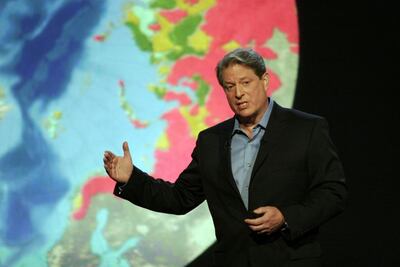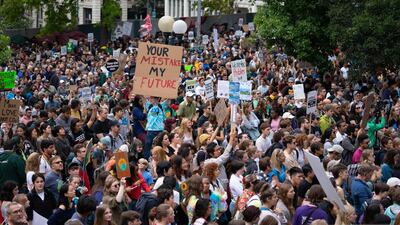With a mixture of awe and wonder, I listened and watched as Greta Thunberg spoke in New York at the United Nations climate change summit this week, bowled over by the 16-year-old's passion and composure. With the suppressed rage of a generation, the teenage activist accused leaders of betraying them by failing to do enough over the last 30 years while the world faces the mass extinction of species and the detrimental effects of climate change.
Then she delivered her killer line: “All you can talk about is the money and fairy tales of eternal economic growth. How dare you?” The penny dropped at that moment. I was not just a bystander to history, witnessing a truly extraordinary moment unfold. Those intended to feel the full force of Ms Thunberg’s powerful message included me.
With this realisation, the mistakes of a lifetime flashed before my eyes. I share the responsibility of having destroyed her dreams and robbed her of childhood. I am now in my mid-40s and like others of my generation, and those who went before me, I have played an undeniable role in the failure to properly address global warming and the threat to nature and animal and plant species from human development.
You see, I had wrongly believed for much of my life that wealth creation from globalisation’s unstoppable force would translate into changes in behaviour and a more sustainable approach to living. Once the collective fear of economic insecurity was a thing of the past in the developed world, we could get on with the business of saving the planet. There would be time enough to do that.
Up until the financial crisis of a decade ago, that fantasy appeared attainable and credible. Record levels of people in emerging economies were no longer poor. Rising energy demand and high oil prices meant that developing renewable sources of power was increasingly becoming a more viable option. Governments around the world began to incentivise the sector in an unprecedented way.
Being a more conscientious consumer seemed, to all intent and purposes, as if I was doing something positive for our future. However, for the past decade, it has become clear that the path we have been on was only a mirage. In that time, we have also been living with the effects of climate change, as weather changes around the world and in the region have caused drought and rising food prices, helping to trigger the political upheaval felt across the Middle East.
Yet we still spend too much time trying to find a singular solution to each symptom instead of dedicating our collective intelligence and effort to the wider source of problems. Ms Thunberg's moving call to action was not the first time this message has been delivered. We have not been properly heeding a peril that has been with us for years. I, too, am guilty of not giving it my attention. In my youth, the work of activists like Greenpeace and others seemed too hysterical in tone for my tastes. When Al Gore, the former US vice president, presented An Inconvenient Truth in 2006, it was too easy for me to dismiss it as the latest attempt by a political opportunist to seek a platform for his own benefit.

Again and again, I kicked the can down the road, addicted to driving my gas-guzzler, flying intercontinental on commercial jets at every opportunity, and stuffing as much meat down my gullet as I could. All the while, I kept my eyes and ears closed while believing my mind was open. Even before Ms Thunberg began her campaign more than a year ago and her courage and determination began to draw attention, I was becoming more conscious of the ever-growing chorus. Meeting people such as National Geographic's champion of biodiversity Enric Sala and legendary polar explorer Robert Swan provided firsthand evidence of how the world – from the Amazon to the Antarctic – had changed for the worse during my lifetime. It helped me understand how urgent the situation is.
Having reported over the years on a number of global crises – from economic and political to humanitarian – this is the most pressing and far-reaching of my career. That perhaps is why it has taken me so long to wake up to my own personal responsibility. Terms like global warming, climate change and extinction are too broad to process on an individual level. if we compare it to financial terms, we can comprehend the idea of hundreds, thousands or millions of dollars, but billions and trillions are unimaginable figures with little practical meaning attached. Yet Ms Thunberg brings home that meaning with resonance because she has devoted her own future to the cause.
In comparison, it makes me question: what have I done over the past 30 years? Almost nothing. I have not just failed her but my own two children too. Every day, I worry that I am not being the best parent I can be, striving to help make sure they are fed, clothed, safe and loved. One of my worst fears is giving one of my boys a reason to look at me the same way Ms Thunberg looked at her audience during that speech. Yet if I continue to do too little, if my contribution to protect their futures is not as diligent and exacting as the other areas in which I strive to be a good father, they might well have cause to do so. I – we – are gambling with their childhood and their futures.
So to Greta, to my boys: I am sorry. I will do better from now on, I promise.
Mustafa Alrawi is an assistant editor-in-chief at The National


